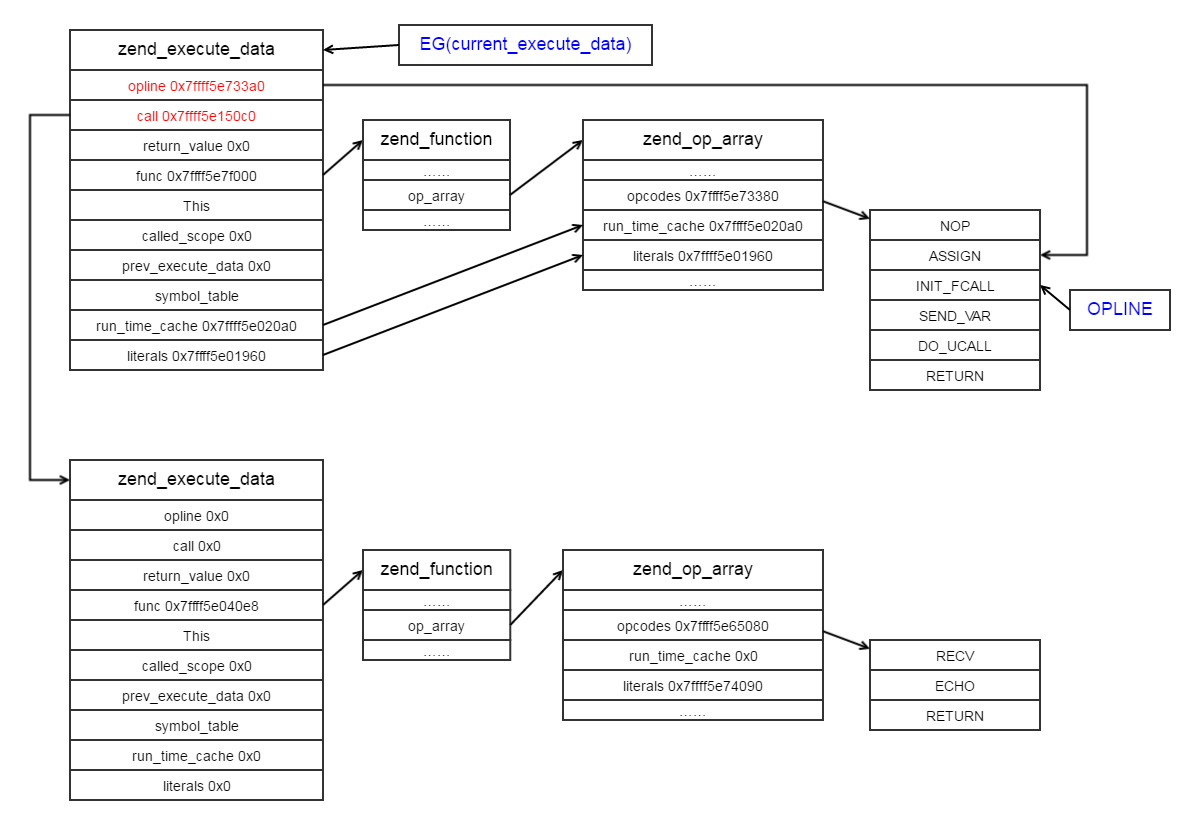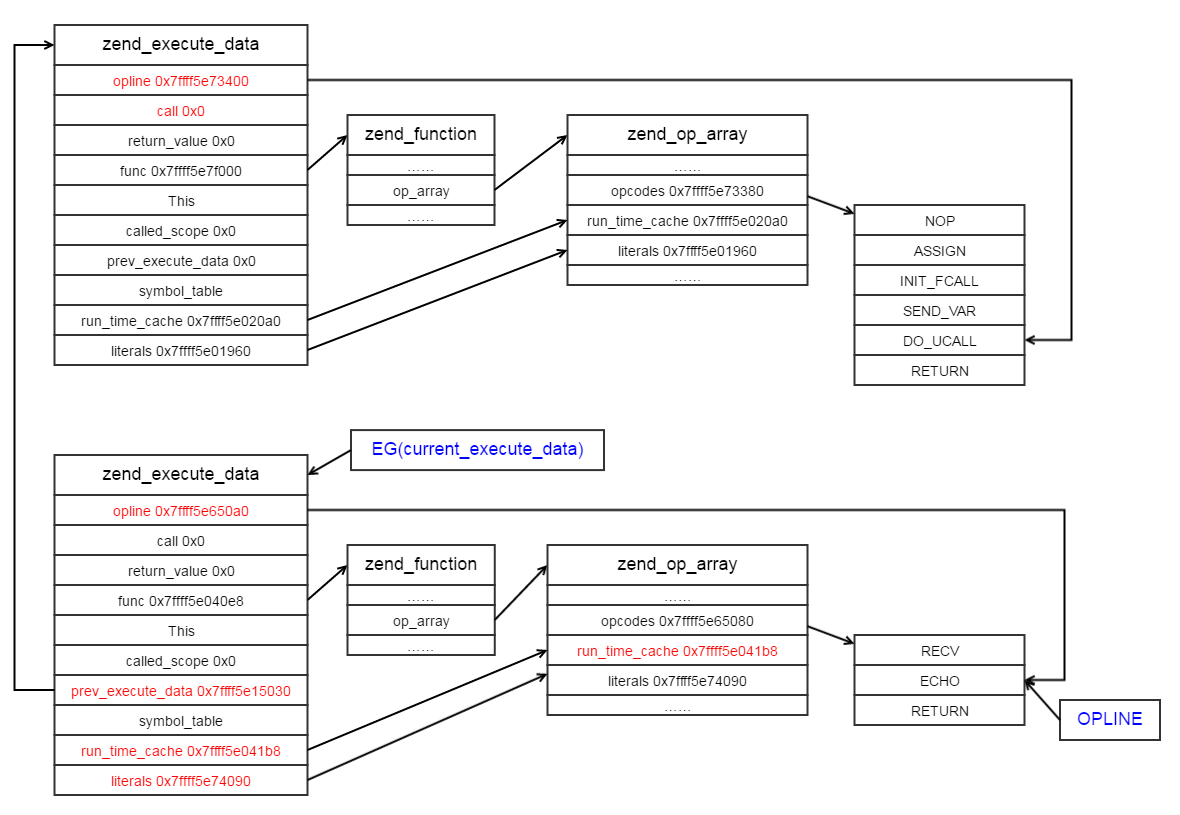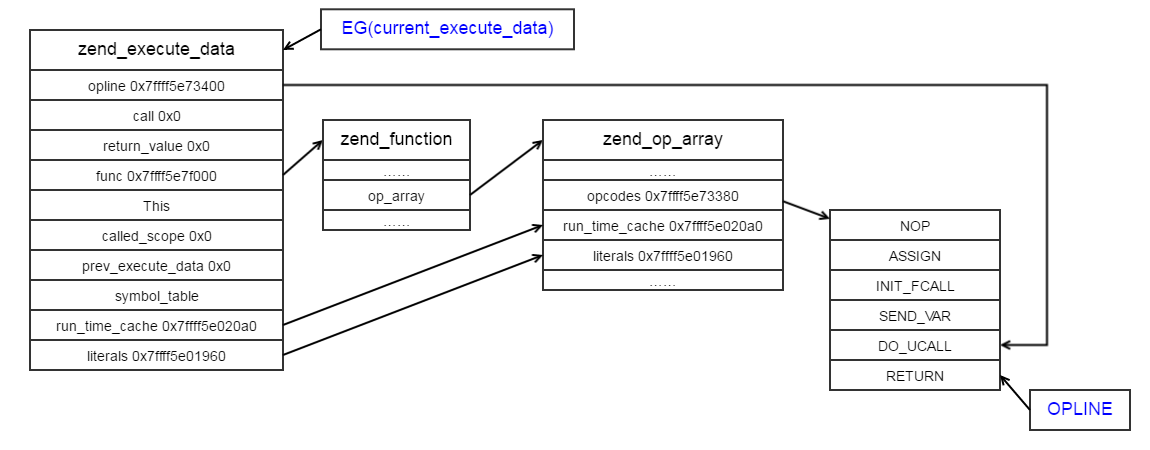PHP 7 中函数调用的实现
先看一个函数调用的OPCode:
function foo($arg) {
echo $arg;
}
$arg = "Hello World\n";
foo($arg);
filename: /home/roketyyang/test.php
function name: (null)
number of ops: 6
compiled vars: !0 = $arg
line #* E I O op fetch ext return operands
-------------------------------------------------------------------------------------
2 0 E > NOP
5 1 ASSIGN !0, 'Hello+World%0A'
6 2 INIT_FCALL 'foo'
3 SEND_VAR !0
4 DO_UCALL
5 > RETURN 1
filename: /home/roketyyang/test.php
function name: foo
number of ops: 3
compiled vars: !0 = $arg
line #* E I O op fetch ext return operands
-------------------------------------------------------------------------------------
2 0 E > RECV !0
3 1 ECHO !0
4 2 > RETURN null
第一个OPArray是/home/roketyyang/test.php文件的,第二个OPArray是foo函数的。
我们来看下/home/roketyyang/test.php是如何被Zend引擎执行的。
堆栈与上下文
在CLI模式下,会调用zend_execute,当执行php /home/roketyyang/test.php时,op_array形参对应的实参就是/home/roketyyang/test.php文件的OPArray:
ZEND_API void zend_execute(zend_op_array *op_array, zval *return_value)
{
zend_execute_data *execute_data; /* 执行上下文 */
if (EG(exception) != NULL) {
return;
}
execute_data = zend_vm_stack_push_call_frame(ZEND_CALL_TOP_CODE, /* 从堆栈上分配一块内存给上下文 */
(zend_function*)op_array, 0, zend_get_called_scope(EG(current_execute_data)), zend_get_this_object(EG(current_execute_data)));
if (EG(current_execute_data)) {
execute_data->symbol_table = zend_rebuild_symbol_table();
} else {
execute_data->symbol_table = &EG(symbol_table);
}
EX(prev_execute_data) = EG(current_execute_data);
i_init_execute_data(execute_data, op_array, return_value); /* 初始化执行上下文 */
zend_execute_ex(execute_data); /* 执行 上下文 */
zend_vm_stack_free_call_frame(execute_data);
}
zend_execute所做的事情主要就是从堆栈中创建一个上下文,初始化上下文环境,然后执行这个上下文,最后释放它。
堆栈是在虚拟机初始化的时候init_executor()调用zend_vm_stack_init()进行初始化的:
static zend_always_inline zend_vm_stack zend_vm_stack_new_page(size_t size, zend_vm_stack prev) {
zend_vm_stack page = (zend_vm_stack)emalloc(size);
page->top = ZEND_VM_STACK_ELEMETS(page);
page->end = (zval*)((char*)page + size);
page->prev = prev;
return page;
}
ZEND_API void zend_vm_stack_init(void)
{
EG(vm_stack) = zend_vm_stack_new_page(ZEND_VM_STACK_PAGE_SIZE(0 /* main stack */), NULL); /* 向PHP的内存管理器申请内存 */
EG(vm_stack)->top++;
EG(vm_stack_top) = EG(vm_stack)->top;
EG(vm_stack_end) = EG(vm_stack)->end;
}
这里有一个EG宏需要了解下,其定义在Zend/zend_globals_macros.h中:
#ifdef ZTS
# define EG(v) ZEND_TSRMG(executor_globals_id, zend_executor_globals *, v)
#else
# define EG(v) (executor_globals.v)
extern ZEND_API zend_executor_globals executor_globals;
#endif
ZTS是在编译的时候开启线程安全选项的时候才有定义的,关于线程安全不进行讨论,executor_globals是一个全局变量,存储着许多信息(当前上下文、符号表、函数/类/常量表、堆栈等),EG宏就是用于访问executor_globals的某个成员。
我们看下表示堆栈的结构体,堆栈的设计跟PHP 5类似:
struct _zend_vm_stack {
zval *top; /* 指向堆栈的顶端 */
zval *end; /* 指向堆栈的底端 */
zend_vm_stack prev; /* 指向上一个堆栈,当前堆栈剩余空间不足时,会向内存管理器申请新的内存创建新的堆栈 */
};
/* 创建堆栈 */
+-----------------+<----- EG(vm_stack)
prev | |
+----------+<-----------------+ vm stack header |
| | | |
| | top +---> +-----------------+
| | | |
+----------+ | |
| |
| |
| |
| |
| |
| |
end +---> +-----------------+
上下文的创建,zend_vm_stack_push_call_frame()->zend_vm_stack_push_call_frame_ex():
static zend_always_inline zend_execute_data *zend_vm_stack_push_call_frame_ex(uint32_t used_stack, uint32_t call_info, zend_function *func, uint32_t num_args, zend_class_entry *called_scope, zend_object *object)
{
zend_execute_data *call = (zend_execute_data*)EG(vm_stack_top); /* 从堆栈顶端分配内存 */
ZEND_ASSERT_VM_STACK_GLOBAL;
if (UNEXPECTED(used_stack > (size_t)(((char*)EG(vm_stack_end)) - (char*)call))) { /* 如果堆栈剩余内存不足used_stack,则创建新的堆栈 */
call = (zend_execute_data*)zend_vm_stack_extend(used_stack);
ZEND_SET_CALL_INFO(call, call_info | ZEND_CALL_ALLOCATED);
} else {
EG(vm_stack_top) = (zval*)((char*)call + used_stack); /* 将堆栈顶指针设置为空闲内存顶端 */
ZEND_SET_CALL_INFO(call, call_info);
}
ZEND_ASSERT_VM_STACK_GLOBAL;
call->func = func;
Z_OBJ(call->This) = object;
ZEND_CALL_NUM_ARGS(call) = num_args;
call->called_scope = called_scope;
return call;
}
我们看下表示上下文的结构体,与PHP 5相比更简洁了,关于PHP 5的execute_data可以看下这篇文章PHP execute_data:
struct _zend_execute_data {
const zend_op *opline; /* executed opline */
zend_execute_data *call; /* current call */
zval *return_value;
zend_function *func; /* executed function */
zval This; /* this + call_info + num_args */
zend_class_entry *called_scope;
zend_execute_data *prev_execute_data;
zend_array *symbol_table;
#if ZEND_EX_USE_RUN_TIME_CACHE
void **run_time_cache; /* cache op_array->run_time_cache */
#endif
#if ZEND_EX_USE_LITERALS
zval *literals; /* cache op_array->literals */
#endif
};
在zend_execute中调用zend_vm_stack_push_call_frame时,对op_array进行了强制类型转换,转换为zend_function*类型,看下其结构体类型:
union _zend_function {
zend_uchar type; /* MUST be the first element of this struct! */
struct {
zend_uchar type; /* never used */
zend_uchar arg_flags[3]; /* bitset of arg_info.pass_by_reference */
uint32_t fn_flags;
zend_string *function_name;
zend_class_entry *scope;
union _zend_function *prototype;
uint32_t num_args;
uint32_t required_num_args;
zend_arg_info *arg_info;
} common;
zend_op_array op_array;
zend_internal_function internal_function;
};
struct _zend_op_array {
/* Common elements */
zend_uchar type;
zend_uchar arg_flags[3]; /* bitset of arg_info.pass_by_reference */
uint32_t fn_flags;
zend_string *function_name;
zend_class_entry *scope;
zend_function *prototype;
uint32_t num_args;
uint32_t required_num_args;
zend_arg_info *arg_info;
/* END of common elements */
uint32_t *refcount;
uint32_t this_var;
uint32_t last;
zend_op *opcodes; /* 当前OPArray包含的所有opcode */
int last_var; /* 当前OPArray中有多少个PHP变量 */
uint32_t T; /* 执行当前的OPArray需要用到多少个临时变量 */
zend_string **vars;
int last_brk_cont;
int last_try_catch;
zend_brk_cont_element *brk_cont_array;
zend_try_catch_element *try_catch_array;
/* static variables support */
HashTable *static_variables;
zend_string *filename;
uint32_t line_start;
uint32_t line_end;
zend_string *doc_comment;
uint32_t early_binding; /* the linked list of delayed declarations */
int last_literal;
zval *literals;
int cache_size;
void **run_time_cache;
void *reserved[ZEND_MAX_RESERVED_RESOURCES];
};
typedef struct _zend_internal_function {
/* Common elements */
zend_uchar type;
zend_uchar arg_flags[3]; /* bitset of arg_info.pass_by_reference */
uint32_t fn_flags;
zend_string* function_name;
zend_class_entry *scope;
zend_function *prototype;
uint32_t num_args;
uint32_t required_num_args;
zend_internal_arg_info *arg_info;
/* END of common elements */
void (*handler)(INTERNAL_FUNCTION_PARAMETERS);
struct _zend_module_entry *module;
void *reserved[ZEND_MAX_RESERVED_RESOURCES];
} zend_internal_function;
可以看出,zend_function作为union类型,能够表示:
- 非函数的OPArray,例如上文中提到的
/home/roketyyang/test.php文件的OPArray - 函数的OPArray,例如上文中提到的foo函数
- PHP扩展中的函数
在堆栈中创建上下文如下:
/* 创建上下文 */
+-----------------+<----+ EG(vm_stack)
prev | |
+----------+<-----------------+ vm stack header |
| | | |
| | +-----------------+
| | | execute_data |
+----------+ | |
+-----------------+
| CV |
+-----------------+
| TMP_VAR |
top +---> +-----------------+
| |
end +---> +-----------------+
除了分配execute_data的存储空间外,还分配了CV(compiled variable,即PHP变量)、TMP_VAR(临时变量,例如执行if (!$a) echo 'a';,就需要一个临时变量来存储!$a的结果)的存储空间。
从i_init_execute_data中看下execute_data的初始化,其中EX宏是用于访问execute_data的成员:
static zend_always_inline void i_init_execute_data(zend_execute_data *execute_data, zend_op_array *op_array, zval *return_value)
{
ZEND_ASSERT(EX(func) == (zend_function*)op_array);
EX(opline) = op_array->opcodes; /* execute_data->opline 指向了要执行的第一个opcode */
EX(call) = NULL;
EX(return_value) = return_value;
/* 对符号表、CV、函数参数进行处理,这部分展开来的话内容较多,可以先不了解 */
if (!op_array->run_time_cache) {
if (op_array->function_name) {
op_array->run_time_cache = zend_arena_alloc(&CG(arena), op_array->cache_size);
} else {
op_array->run_time_cache = emalloc(op_array->cache_size);
}
memset(op_array->run_time_cache, 0, op_array->cache_size);
}
EX_LOAD_RUN_TIME_CACHE(op_array); /* EX(run_time_cache) = (op_array)->run_time_cache */
EX_LOAD_LITERALS(op_array); /* EX(literals) = (op_array)->literals */
EG(current_execute_data) = execute_data;
ZEND_VM_INTERRUPT_CHECK();
}
初始化完execute_data后,就调用execute_ex执行opcode了:
//删除了预处理语句
ZEND_API void execute_ex(zend_execute_data *ex)
{
DCL_OPLINE
const zend_op *orig_opline = opline;
zend_execute_data *orig_execute_data = execute_data; /* execute_data是一个全局变量 */
execute_data = ex;
LOAD_OPLINE();
while (1) {
((opcode_handler_t)OPLINE->handler)(ZEND_OPCODE_HANDLER_ARGS_PASSTHRU); //执行OPCode对应的C函数,OPLine是一个全局变量
if (UNEXPECTED(!OPLINE)) { //当前OPArray执行完
execute_data = orig_execute_data;
opline = orig_opline;
return;
}
}
zend_error_noreturn(E_CORE_ERROR, "Arrived at end of main loop which shouldn't happen");
}
以文章开头的例子看看OPCode执行时上下文的变化情况和函数调用是怎么实现的:
在初始化完execute_data时:

跳过NOP、ASSIGN,直接看INIT_CALL:
static ZEND_OPCODE_HANDLER_RET ZEND_FASTCALL ZEND_INIT_FCALL_SPEC_CONST_HANDLER(ZEND_OPCODE_HANDLER_ARGS)
{
USE_OPLINE
zval *fname = EX_CONSTANT(opline->op2); /* 函数名 */
zval *func;
zend_function *fbc;
zend_execute_data *call;
fbc = CACHED_PTR(Z_CACHE_SLOT_P(fname)); /* 查看EX(run_time_cache)是否已缓存了函数引用 */
if (UNEXPECTED(fbc == NULL)) {
func = zend_hash_find(EG(function_table), Z_STR_P(fname)); /* 尚未缓存,在函数表中查找 */
if (UNEXPECTED(func == NULL)) {
SAVE_OPLINE();
zend_throw_error(NULL, "Call to undefined function %s()", Z_STRVAL_P(fname)); /* 函数表中没找到 */
HANDLE_EXCEPTION();
}
fbc = Z_FUNC_P(func);
CACHE_PTR(Z_CACHE_SLOT_P(fname), fbc); /* 函数表中找到了,进行缓存 */
}
call = zend_vm_stack_push_call_frame_ex( /* 创建新的execute_data */
opline->op1.num, ZEND_CALL_NESTED_FUNCTION,
fbc, opline->extended_value, NULL, NULL);
call->prev_execute_data = EX(call);
EX(call) = call;
ZEND_VM_NEXT_OPCODE();
此时execute_data情况:

跳过SEND_VAR(传参),看DO_UCALL:
static ZEND_OPCODE_HANDLER_RET ZEND_FASTCALL ZEND_DO_UCALL_SPEC_HANDLER(ZEND_OPCODE_HANDLER_ARGS)
{
USE_OPLINE
zend_execute_data *call = EX(call); /* 被调用的函数 */
zend_function *fbc = call->func; /* 被调用函数的OPArray */
zval *ret;
SAVE_OPLINE();
EX(call) = call->prev_execute_data;
EG(scope) = NULL;
ret = NULL;
call->symbol_table = NULL;
if (RETURN_VALUE_USED(opline)) { /* 检查返回值是否有用到 */
ret = EX_VAR(opline->result.var);
ZVAL_NULL(ret);
Z_VAR_FLAGS_P(ret) = 0;
}
call->prev_execute_data = execute_data;
i_init_func_execute_data(call, &fbc->op_array, ret, 0); /* 初始化被调用函数的上下文 */
ZEND_VM_ENTER(); /* execute_data = EG(current_execute_data); opline = EX(opline); return; */
}
此时execute_data情况:

echo输出后,进入return:
static ZEND_OPCODE_HANDLER_RET ZEND_FASTCALL zend_leave_helper_SPEC(ZEND_OPCODE_HANDLER_ARGS)
{
zend_execute_data *old_execute_data;
uint32_t call_info = EX_CALL_INFO();
if (EXPECTED(ZEND_CALL_KIND_EX(call_info) == ZEND_CALL_NESTED_FUNCTION)) {
zend_object *object;
i_free_compiled_variables(execute_data); /* 释放OPArray中的PHP变量 */
/* 省略 */
old_execute_data = execute_data;
execute_data = EG(current_execute_data) = EX(prev_execute_data); /* 将当前的execute_data设置为上一个 */
/* 省略 */
zend_vm_stack_free_call_frame_ex(call_info, old_execute_data); /* 释放在堆栈上分配的空间 */
/* 省略 */
LOAD_NEXT_OPLINE(); /* opline = EX(opline) + 1 */
ZEND_VM_LEAVE(); /* return */
}
/* 省略 */
}
此时execute_data的情况:

总结
希望通过本文,读者能够大概地了解到PHP OPCode执行时,当发生函数调用时的上下文切换情况,对于其他的许多细节问题,比如符号表/临时变量等,尚未研究过。